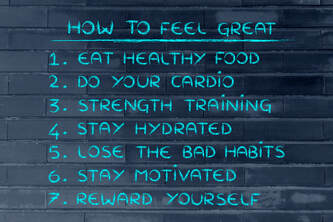What is a habit?A habit is a behavior that's performed automatically. Obviously, habits can be good or bad. This week I'll focus on developing good habits, but note that good habits can replace "bad" habits. In fact, making small, continuous changes create habits that actually stick! That's because they don't require you to completely change everything about your life. They're built up over a longer period of time, which means you learn to manage and maintain them along the way. In Deepak Chopra's book "Super Genes," he breaks down the lifestyle choices for increasing well-being into easy choices, harder choices, and experimental choices. The easy choices are easy for anyone to implement. By starting with these choices and adopting one per week for the year, you're laying the foundation of your pyramid of increased well-being. The harder choices are those that most people might feel more resistance towards adopting. They might be more difficult to maintain. For example an easy choice for improving your diet could be to eat a side salad with lunch or dinner, while a harder choice might be to completely cut out sugar. Or an easy choice for exercising more could be getting up and moving around once an hour, while a hard choice could be devoting half of your lunch break to exercising. Once you've made all of the easy choices you can make, you've likely built up the muscle for creating good habits, so when you have the foundation laid, it's easier to make that harder choice. In fact, if you've made quite a few of the easy choices, you're likely beginning to experience some of the benefits of the good habits and it makes it easier to keep going when you're motivated! Attach your habit goals to achievement goals. While habit goals involve regular, ongoing activity, achievement goals are focused on one-time accomplishments. Your achievement goal could be running a 10k, finishing a novel, or losing a certain amount of weight. Remember, that in order to be effective, achievement goals need to have a date, or deadline attached to them. These two types of goals can be used to increase the chance of success for each. Without a plan, it can be difficult to achieve your bigger goal. Likewise, if the habits you want to implement don't have a bigger "why" attached to them, it can be hard to stay with them. Try this when implementing a new habit.
Remember it will likely take longer than you think to fully establish the habit. The old idea of it taking 21 days to establish a habit was never grounded in research. The time to establish a habit varies and can take at least 66 days! Don't forget that your "what" needs a "why."When we start towards a new goal, we have plenty of enthusiasm. It's when the real work sets in or when the habit isn't convenient that we want to quit.  Michael Hyatt talks about five elements he leverages so that he doesn't quit in his book, "Your Best Year Ever."
Recognize Your Achievements I'd like to spend this last little bit reminding you to celebrate your successes...each and every one of them. Keep a record of the habits you've built and the steps you've taken along the way. If you keep going from one step to another without paying attention to the fact that you've achieved them, you'll very well feel dissatisfied with your results even if you're improving, reaching goals, and setting new ones.
0 Comments
Leave a Reply. |
Click below to join my FREE Facebook Group-
Women's Wellness Circle: Create Your Extraordinary Life AuthorHi, I’m Crystal! If you'd like to access my Farmer's Market Friday posts from 2018, click here!
Categories
All
|



 RSS Feed
RSS Feed